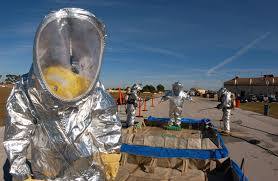
A large-scale biological event shouldn’t mean that the nation’s thousands of state, local, tribal, and territorial (SLTT) governments fend for themselves waiting for federal assets to arrive, a new bipartisan report of the Blue Ribbon Study Panel on Biodefense says.
“We can take steps now to reduce the impact large-scale biological events will have on our states, localities, tribes, and territories,” concludes Holding The Line On Biodefense: State, Local, Tribal, and Territorial Reinforcements Needed, the study panel’s just-released October 2018 report.
Among eight recommendations, the study panel suggests one preemptive step would be to allocate response funding before biological crises occur, thereby enabling all levels of government and the private sector to defend the nation against biological threats and their potentially large-scale consequences.
“We would like to see state governors, territorial governors and administrators, tribal leaders, mayors, borough council presidents, and township supervisors make biodefense a greater priority before biological attacks, accidents, outbreaks, epidemics, and pandemics place the lives of their constituents at risk,” according to the report’s executive summary.
A major bioterror attack, whether intentional, unintentional or naturally occurring, is imminent, said former U.S. Sen. Joseph Lieberman, co-chairman of the study panel, during an Oct. 9 panel meeting held in Washington, D.C. Another infectious disease pandemic also will take place, he said, “but we don’t know when, even though we can say with reasonable certainty that both awful events will occur.”
Therefore, added Lieberman, it’s imperative for the United States government “to get ahead of the threat rather than be reactionary.”
The other seven proactive steps recommended by the Blue Ribbon Study Panel on Biodefense are to fortify emergency medical services (EMS); improve Strategic National Stockpile (SNS) distribution and pharmacy readiness; increase hospital surge capacity; augment laboratory responses; rectify shortfalls in tribal emergency public health preparedness; overcome barriers to territorial biosurveillance and response; and assume broader leadership of biodefense, the Blue Ribbon panel said.
Specifically, the Holding the Line on Biodefense report recommendations aim to increase the capability of the SLTT public and private sectors to share associated costs with the federal government to prepare, respond and recover from massive biological events.
Currently, the nation’s response to large-scale biological events is out of balance with its preparedness, according to Blue Ribbon Study Panel member Donna Shalala, former U.S. Secretary of Health and Human Services (HHS). Shalala co-chaired a January panel meeting in Miami that informed much of the report’s recommendations.
“There are a number of steps we can take right now to better position SLTT governments, as well as hospitals, pharmacies, and other private-sector organizations to respond immediately and then in tandem with federal support,” she said earlier today in a statement.
For example, the panel suggests a critical step to fortify nationwide EMS would be to unify and establish a new National Emergency Medical Services system that included establishment of a National Emergency Medical Services Agency at HHS, according to the report.
Among myriad actions to take toward that goal, the study panel recommends that Congress amend the Defense Against Weapons of Mass Destruction Act of 1996 to require a report from the HHS secretary — as well as the secretaries of Defense, Homeland Security, and Transportation — on the ability of SLTT EMS and the federal government to provide response services during an emergency, as well as what improvements to make, and what federal support for SLTT EMS exists for preparedness, response and recovery efforts.
The study panel’s recommendation to improve SNS distribution, as well as distribution of other stored pharmaceuticals, equipment and essential medical supplies during a large-scale bio-event, could be done via enhanced training and improved access to pharmacy readiness data, according to the report’s action items.
For instance, to improve, expand, enhance, and sustain SLTT training to receive and distribute SNS contents, Congress should amend the Public Health Service Act to require the HHS Office of the Assistant Secretary for Preparedness and Response (ASPR) and the CDC Division of State and Local Readiness to work with SLTT stakeholders, according to the report.
If amended, the law would direct the participants to improve existing SNS training offerings, such as by the ASPR and CDC boosting collaboration with private-sector entities like pharmacy chains to distribute pharmaceuticals for public health purposes and then training accordingly.
“Each level of the government has yet to develop sufficiently comprehensive plans for addressing the need to provide for public health, safety, and security during and after large-scale biological events,” the study panel report says, noting that steps should be taken promptly to reduce the subsequent impact on SLTTs.




